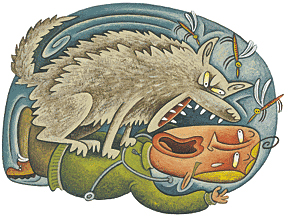
Bill Danforth GNu’98 has no trouble remembering the day he arrived in Bethel, Alaska, population 6,000, three years ago this month: The voracious mosquitoes. The barking packs of dogs. The “omnipresent sunshine.” The “suffocating, pulverized glacial-silt dust.” And the “flat, treeless terrain.”
It is not exactly the stuff of tourist brochures. And yet, he says in an e-mail interview, “there is also a ‘Garden of Eden’ purity that brings you back to the bliss of early childhood.”
Three months after that first visit, he and his partner, Elsee Larsen GNC’98, decided to move there. They took over the Bethel Family Clinic, the only private clinic in the vast Yukon-Kuscokwim Delta region of western Alaska. (Asked what he did to prepare himself for the inevitable culture shock, Danforth answers: “Bought a minus-100-degree-rated coat and silk underclothes at Eddie Bauer.”)
Danforth describes the Yup’ic Eskimos as “neat people: mellow, open-minded, and fun,” adding that there are “also Chup’ic and some Athabaskan Eskimos.” In fact, he says, “Bethel is very diversified, with representations from all ethnicities. There are African Americans, Filipinos, Russians, Albanians, Koreans, Central Americans, Mexicans. And lurking behind the inhospitable environment is this omnipresent bliss.”
To the soft inhabitants of the lower 48, Danforth’s Garden of Eden might sound a tad hellish. “This is a place of extremes,” he acknowledges. “The worst is that it is difficult to go outside: the winter is brutal—the winter before last saw temps as low as minus-100 degrees with wind-chill; the ice makes walking difficult; in the spring the roads are so muddy that even four-wheelers get stuck.”
Summer is even worse, with its “swarms of mosquitoes and the dust which is like having talcum powder thrown at you all day.” Even the free-running dogs defy the romantic image of the disciplined Husky. (“I had a Rottweiler try to take my kneecap the other day,” remarks Danforth.)
Then there are the health issues, which brought him there in the first place—and which can be staggering. For starters, there is alcoholism—“a major problem, particularly with the risk of freezing to death in the winter”—and its tragic companion, fetal-alcohol syndrome. The nation’s second inhalation-abuse center opened there last summer. In addition to “high incidence of self-mutilation and perforated tympanic membranes” (ruptured eardrums, the product of chronic exposure to loud noise from guns, chain saws, fish-cannery work, etc.), there is a good deal of violent crime, including the shooting deaths of Bethel High School’s principal and another student three years ago.
Into that stew add “very high rates of infectious hepatitis, botulism (particularly with the advent of canning), teenage pregnancy, H. pylori, MRSA-resistant cellulitis, RSV pneumonia.” Asked why the rates of infectious diseases are so high, Danforth points to the “commonality of ‘honey buckets’”—buckets used as toilets that are left in the streets for bi-weekly emptying.
The region also has some of the highest rates of chlamydia and gonorrhea in the nation, and the subject of social diseases leads inevitably to the “interesting” social mores.
“I’ve been to a few parties where I had to excuse myself as folks gradually disrobed and men pushed their wives on you,” says Danforth. He recalls the time a Native patient invited him to dinner: “As he became increasingly inebriated, he became more bellicose about me refusing his wife. He then smiled and offered me his 16-year-old daughter. As I tried to politely refuse, he cursed and screamed, ‘You cussak; what’s wrong with my wife and daughter —aren’t they good enough for you?’” When their host began “fumbling around with the kitchen knives,” Danforth and Larsen quietly slipped out the door.
The Bethel Family Clinic—a not-for-profit facility—was “severely” in debt by the time he and Larsen arrived in October 1999. Though they worked hard to pay off some of that debt, it looked as though the clinic would go belly-up. Then, last summer, they were contacted by the U.S. Department of Health and Human Services and the Alaska Department of Health and Social Services about some funds that would be available that fall. Over a three-week period, when they weren’t attending to patients, they worked late into the night to finish the grant proposal.
By last September, they were preparing to close the clinic for lack of funds. Then, on September 28, they learned that they would be receiving a grant worth $502,000. The Bethel Family Clinic was back in business.
For Danforth and Larsen, their time in Bethel has been an extraordinary experience. “Though we came here right after graduating from Penn as brand-new Nurse Practitioners, we know our careers have peaked here,” says Danforth. “Every NP should have this place as a start. We have had so much independence, so much positive feedback from the community and the board of the clinic, and frankly success beyond what one would imagine.”
Some day, he says, he and Larsen will live someplace “normal.” But for now, they are loving every mosquito-bitten, dust-choked, nose-freezing, disease-festering, wife-proffering minute of it.

